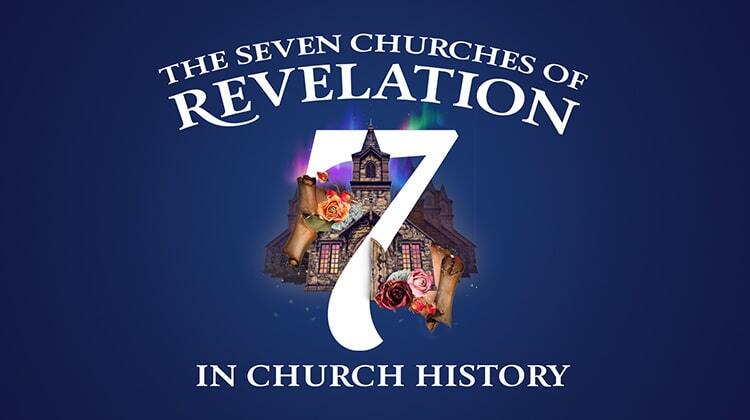After His resurrection, Jesus Christ commissioned the apostle John to write letters to seven churches in Asia Minor about their spiritual condition. Each letter identified the church’s strengths and weaknesses and gave instructions for finding its spiritual footing. These messages reveal that the ancient Church contended with many of the challenges God’s people face today. By studying Christ’s letters to the seven churches of Revelation, we can gain a greater perspective of Church history and faithful Christian living.
Understand the seven churches in the framework of Revelation
Interpret the seven letters through three layers of meaning
Recognize the seven churches as periods of church history
Acknowledge Christ’s message to the Church of today
Understanding the Seven Churches in the Framework of Revelation
When Christ gave these messages to the apostle John, he was in exile on the island of Patmos. Rome had banished John to keep him from contributing to the growth of Christianity in the Empire. But even the most powerful nation in the world could not prevent John from spreading Christ’s revelation of “the things which you have seen, and the things which are, and the things which will take place after this” (Revelation 1:19).
The “things which you have seen” are the revelations of Christ Himself to John in Revelation 1. The “things which are” constitute the seven messages of Christ to seven churches in Asia Minor—churches in the cities of Ephesus, Smyrna, Pergamum, Thyatira, Sardis, Philadelphia, and Laodicea. We find these messages in Revelation 2–3. The “things which will take place after this” make up the rest of the book: Revelation 4–22.
Interpreting the Seven Letters Through Three Layers of Meaning
Primary association.
The first step in Bible study is to determine what the passage of Scripture meant to its original audience: who wrote it, when and why, and to whom. Scholars refer to this as the grammatical-historical method—determining what the Bible meant in its original context. We could also call it discovering the primary meaning.
Jesus Christ addressed His letters to historical churches in seven cities: Ephesus, Smyrna, Pergamum, Thyatira, Sardis, Philadelphia, and Laodicea. We begin our study of the seven letters by understanding their historical context—discerning their geographical, social, and political challenges as well as their spiritual strengths and weaknesses.
Personal application.
This step begins by asking, What does the passage mean to me? We could refer to this as discovering the personal meaning of the text. We could apply those two steps—primary interpretation and personal application—and be well equipped for the task of “rightly dividing the word of truth” (2 Timothy 2:15).

Christ’s letters are “profitable” for Christians of every era (2 Timothy 3:16). Because there is “nothing new under the sun” (Ecclesiastes 1:9), the problems that beset the seven churches of Revelation reflect the challenges we face today. No one’s opinion about the Church is more important than that of the Head of the Church (Ephesians 5:23; Colossians 1:18), so every word Jesus gave to the seven churches speaks to Christians today. Christ Jesus’ goal is not merely to criticize but to correct, beginning with individual believers.
Prophetic anticipation.
All passages have a primary interpretation and a personal application; some also have a prophetic application. That means their general relevance reaches beyond the primary (past) and the personal (present) perspectives and extends into the future. Many scholars agree that Christ’s message to the seven churches prophetically revealed seven distinct ages of church history. So Christ’s letters to the seven first-century churches in Asia Minor require all three kinds of understanding: primary, personal, and prophetic.

Recognizing the Seven Churches of Revelation as Periods of Church History
When we place Christ’s letters in the context of history, the Ephesian church prophetically correlates to the apostolic Church, the Laodicean church represents the Church in the World of the End, and the other churches depict intervening periods of history.
Ephesus: the first-century apostolic Church.
It is not unusual to be excited about new things and to grow indifferent toward them over time. As we observe in the church at Ephesus, it can even happen in our relationship with Jesus. The excitement of meeting and following Him can become routine.
Christ warned the Ephesian church: If you do not “repent and do the first works, I will come to you quickly and remove your lampstand from its place” (Revelation 2:5). In other words, He would remove the church’s influence and power. Drifting away from the Lord always exacts a toll. Looking back at history, we can see that by the end of the Apostolic Age, the Early Church lost much of its momentum, and the Ephesian church dissolved in the second century.
When we find ourselves drifting from the Lord, the solution is to remember our initial enthusiasm, repent of our apathy, and recover our original passion for the Lord.
Smyrna: the persecuted Church of the second and third centuries.
In Revelation 2:10, Christ said, “Do not fear any of those things which you are about to suffer. Indeed, the devil is about to throw some of you into prison, that you may be tested, and you will have tribulation ten days.” There has been no end to the speculation about this reference to “ten days.” Some think it refers to ten years of persecution for the church in Smyrna. Others believe it refers to Roman persecution in the second and third centuries. Historians tell us the Church endured ten waves of persecution under ten Roman emperors ending with the reign of Diocletian.
Christians in developed countries today think little about being persecuted for their faith. But for many churches in the world, persecution is as much a daily reality as it was for the ancient church in Smyrna. Christ’s brief letter to Smyrna contains a powerful principle for Christians of every age: the opposite of fear is faith—faith in God, faith in what He has said, faith in who He is, and faith in what He has promised us: “Be faithful until death, and I will give you the crown of life” (Revelation 2:10).
Whatever we believe about the meaning of “ten days,” as Christians, we have confidence that “our light affliction, which is but for a moment, is working for us a far more exceeding and eternal weight of glory” (2 Corinthians 4:17).
Pergamos: the worldly Church after its integration with the Roman Empire.
One of Satan’s favorite tactics is to weaken the Church through compromise. He used “the doctrine of Balaam” and “the doctrine of the Nicolaitans” to dilute the teachings of the Pergamos church. In the fourth century, he successfully Christianized the Roman Empire and Romanized the Christian Church. The unholy alliance between the Church and Rome undermined Christianity for centuries. Satan has not given up on that strategy; he still works to corrupt the Church and Christian families through compromise.
In today’s society, compromise often goes by the buzzword of “tolerance.” Everyone and everything is tolerable except for the absolute truth claims of Christianity. Churches and believers find themselves pressured to conform to worldly values. The solution is to “hold fast to [Christ’s] name” (Revelation 2:13), testify to His Gospel, and stop compromising His Truth.
Thyatira: the Church of the Middle Ages.
The church in Thyatira was steadfast, generous with others, and loving. Its members worked long and hard for the Lord. But because of the church’s devotion, Satan placed a target on its back. Knowing the believers in Thyatira wouldn’t fall for an obvious ploy, Satan used an immoral individual to infiltrate their camp. Before long, sexual immorality and spiritual impurity consumed the church (Revelation 2:20).
The Church of the Middle Ages succumbed to the same temptation. Ray Stedman offers this description: “It was a time when the church became corrupt by combining pagan rites and Christian teaching. Many pagan practices and heathen rituals were introduced into the churches, baptized with Christian terminology, related in some way to elements of the Bible, and thus accepted as being true: Images began to be worshipped in churches…. The control of political powers by religious authorities was widely sought.”
Satan is alive and well and will do anything to keep Christians from remaining faithful to the end. Today’s Christians and churches feel pressure to be relevant and all-inclusive regarding spiritual and moral boundaries. We would do well to regard Christ’s warnings and promises to the church in Thyatira as watchwords for this present day.
Sardis: the Church of the Protestant Reformation.
Sardis means “escaping ones” or “those who come out.” In the prophetic view of the Church, Sardis represents the Age of Reformation (A.D. 1517-1750). During that time, many sincere Christians came out of the Roman church searching for sound biblical doctrine and practice—leaders like Luther, Knox, Wycliffe, and Zwingli.
Like the Church of the Middle Ages, the church in Sardis maintained spiritual practices and, on the surface, appeared to be vibrant. However, it died spiritually. Sardis calls to mind Jesus’ description of the Pharisees: “like whitewashed tombs which indeed appear beautiful outwardly, but inside are full of dead men’s bones and all uncleanness” (Matthew 23:27). Only a few faithful followers of Jesus Christ escaped the spiritual decay that gripped the church in Sardis.
Complacency is the villain of this precautionary tale. The church in Sardis and the Church of the Middle Ages largely died off because they rested on past accomplishments and tolerated sin. We can avoid a similar fate by following the apostle Paul’s instruction: “Examine yourselves as to whether you are in the faith. Test yourselves” (2 Corinthians 13:5).
Philadelphia: the Church of the modern missionary movement.
In many places, church life has become complicated and multi-faceted. But for the church in Philadelphia—one of only two that received Christ’s unfettered praise—life was simple and principled. Situated at the gateway of a large, populous region, Philadelphia’s church reached far beyond its geographical boundaries with the Gospel. Although the church wasn’t particularly influential or powerful, its members remained faithful to the Lord and His Word while leveraging the ministry opportunities afforded by their location. Philadelphia’s church embodied Paul’s admonition in Galatians 6:9: “And let us not grow weary while doing good, for in due season we shall reap if we do not lose heart.”
From a prophetic perspective, the Philadelphia church represents the universal Church from the beginning of the nineteenth century to the Rapture, overlapping with the period characterized by the church in Laodicea. It provides an exemplary model for modern congregations and individual members.
Laodicea: the apostate Church at the end of this age.
Of all the places in Scripture where God uses harsh language to address His people, Christ’s stern words to the church in Laodicea are unparalleled. This letter is the only one of the seven that says nothing positive about the church it addresses. Christ accuses the church of compromise, pridefulness, and ungodliness.
The Laodicean church is more like today’s Church than we’d care to admit. John Stott wrote: “Perhaps none of the seven letters is more appropriate to the twentieth-century church than this. It describes vividly the respectable, sentimental, nominal, skin-deep religiosity which is so widespread among us today. Our Christianity is flabby and anemic. We appear to have taken a lukewarm bath of religion.” Instead of pointing people to Christ, the Laodicean church—and, by extension, much of the modern Church—is characterized by self-absorption and ineffectiveness.
Only repentance can restore an apostate. First John 1:9 says, “If we confess our sins, He is faithful and just to forgive us our sins and to cleanse us from all unrighteousness.”
Acknowledging Christ’s Message to the Church of Today
In 1851, William Holman Hunt painted what has become one of the most famous religious paintings in the world. Titled “The Light of the World,” it depicts a long-neglected cottage overgrown with vines, the front door closed and shut tight with no visible handle. Standing at the door, arrayed in kingly robes with a crown on His head and a lantern in one hand, is Christ Jesus. With His other hand, Christ is knocking on the door. When someone accused Holman of neglecting to paint a handle on the outside of the door, he replied that it was not a mistake. The door has no exterior handle because those within the Church must open the door to Christ. He will not force His way into our lives.

Each letter to the seven churches of Revelation carries an application for God’s people today. And the future of our local churches depends on us, the individual members. Let me ask: Are you propelling your church toward Christ or compromise? Are your doors opened or closed to Him? I am determined that Hunt’s painting will never reflect any church I am a part of—may it never portray yours. No matter where you are in your walk with the Lord, as long as you are on this earth, there is time to recover your love for Him, repent of any sinfulness, and revive lifeless congregations. Christ’s invitation to the seven churches of Revelation still stands:
“He who has an ear, let him hear what the Spirit says to the churches”
(Revelation 2:7, 11, 17, 29; 3:6, 13, 22).
